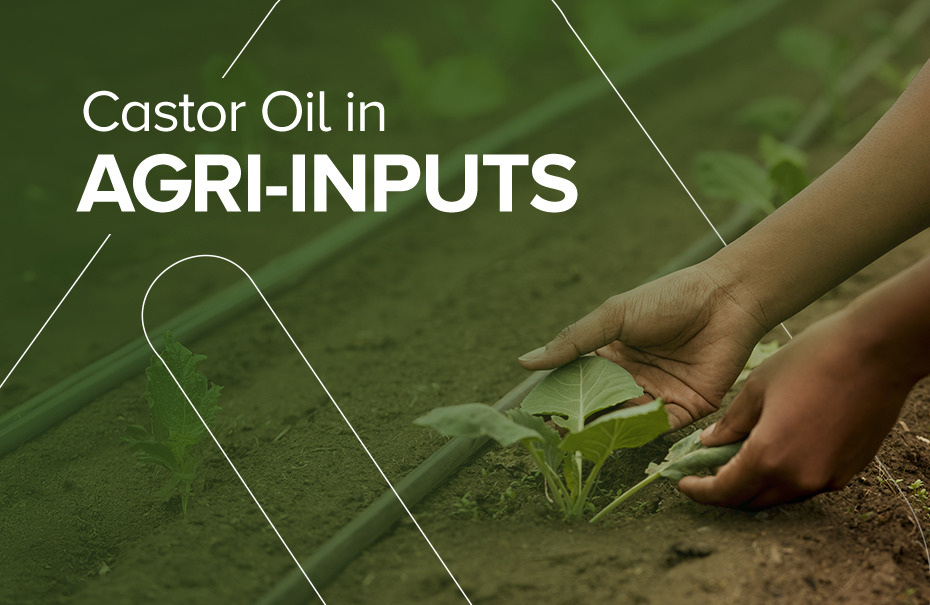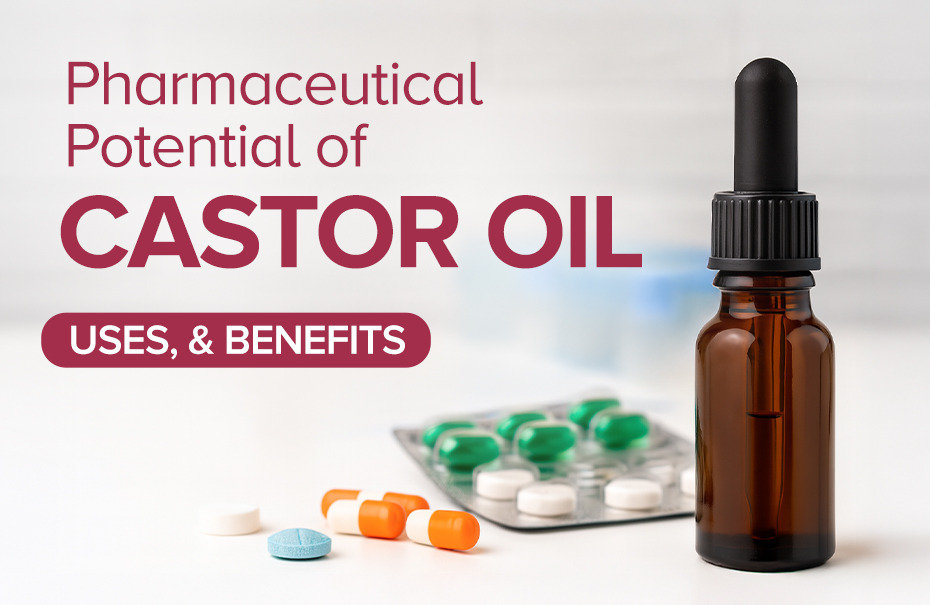Castor Oil in Agri‑Inputs: From Eco‑Pesticides to Soil Enhancers

Castor oil has become a resourceful and environmentally friendly agricultural input in the wake of increasing environmental challenges. As people become increasingly aware of the idea of sustainability, the adherence to sustainable farming grows.
Castor oil is obtained through the seeds of the Ricinus communis plant and is abundant in ricinoleic acid, hence a natural option to be used in alternative crop protection, soil conditioning, and plant health growth. This offers great promise as a bio-based solution that is fast attracting the interest of farmers, agronomists, and policymakers.
Major players in castor oil production have started producing special agri-grade castor oil derivatives that increase yields, besides making the agricultural operations less reliant on the use of synthetic chemicals and hence greener, safer, and more sustainable farming ecosystems.
Castor Oil: Transforming Sustainable Agriculture
The agriculture sector is shifting towards environmentally friendly and safe inputs including soil and living organisms and inputs that are practical in keeping off the pests and diseases. And, castor oil fits absolutely well to meet all these requirements. In contrast to the regular chemical pesticides and fertilizers, the products based on castor oil can be decomposed easily without leaving any toxic residues in soil or water.
Furthermore, it is worth knowing that the global market of castor oil and derivatives reached USD 1.46 billion in the year 2025 at an annual growth rate of 5.9%. Adoption of castor oil in agricultural practices is one of the key reasons for this growth.
These are its main characteristics:
- Natural Pest Protection: Ricinoleic acid and several bioactive compounds prevent nematodes, aphids and other whiteflies from approaching them.
- Better Soil Health: Through castor oil derivatives, the soil aeration and the organic level in the soil are enhanced.
- Eco-Compatibility: It is not harmful to people and most helpful insects and fits the concept of integrated pest management (IPM).
5 Key Roles of Castor Oil in Sustainable Agriculture
#1 Castor Oil as an Eco-Pesticide
The well-known agricultural application of castor oil is in eco-pesticide formulations. When emulsified or combined in other types of plant-based extraction, it acts as an excellent protective barrier to various insect pests, especially:
- Nematodes: The nematicide of castor oil cake is a popular by-product of oil extraction. It not only wards off the nematodes but also provides useful material to the soil (such as nitrogen, phosphorous and potassium).
- Leaf-Feeding Insects: Castor oil applied as a foliar spray suffocates ingested soft-bodied insects and suppresses incidental damages that typically are caused by synthetic pesticides.
The combination of these two functions (pest-repelling and soil enriching) makes castor oil-based solutions the favorite of organic farmers.
#2 Castor Oil as a Soil Enhancer
Apart from pest control, the castor oil derivatives play a major role in improving the soil. An example is the use of castor oil cake, which is highly nourished in proteins and other nutrients that gradually break down and deposit very crucial minerals back in the soil. This slow-release feature guarantees long-term fertility of the soil, and it is not subject to nutrient leaching as synthetic fertilizers are.
The most important soil advantages are:
- Better soil structure due to higher content of organic carbon.
- Enhanced ability of water retention.
- Increased microbial activity that promotes the growth of plants.
#3 Castor Oil in Seed Germination
When applied as a seed coating and as part of pre-sowing treatment measures, Castor oil enhances the germination percentage of seeds by protecting the seeds against fungal diseases and initial pest attacks. It has natural antifungal qualities that form a protective shield so that seeds can germinate in a healthier environment.
Additionally, the nutrient release rate of the castor derivatives is slow, which benefits root development at early growth stages. This guarantees stronger plants, consistent crop establishment, better withstanding stresses caused by the environment, the basis of increased production, and better quality crops.
#4 Castor Oil in Weed Control
Bio-herbicidal properties of castor oil place it in a good position to combat invasive weeds. In concentrated emulsions, or when incorporated as produced castor oil cake, it interferes with weed seed germination and prevents root growth.
This will prove especially helpful to:
- Broadleaf Weeds: Castor oil phytotoxic compounds are specifically targeted to the physiology of weeds with no harm to the intended crop.
- Soil-Borne Weeds: Castor oil is a soil chalker and it changes the soil, and is not so supportive for weeds.
The introduction of organic soil fertilizers, by jointly utilizing castor oil as a means of suppressing weeds, therefore, provides a more environmentally-friendly alternative to safeguarding crops.
#5 Castor Oil for Crop Disease Control
The high level of ricinoleic acids in castor oil grants the oil its antifungal and antibacterial nature. In agriculture, it is used as a prophylactic spray or soil drench to protect crops against typical infections, in particular:
- Fungal Diseases: Due to the presence of natural compounds, castor oil possesses the ability to stop disease-causing agents like Fusarium and Aspergillus leading to decreased root and leaf damage.
- Bacterial Infections: As an antibacterial agent when applied on the surface of leaves they form a barrier against bacterial blights and spots.
Why Castor Oil is a Smart Choice for Sustainable Farming?
1. The Role of Quality Manufacturing and Innovation
Manufacturing standards are essential in determining the quality and efficacy of castor oil to be used in agriculture. Refined extraction procedures, filtration procedures, and quality tests make sure that the oil preserves its essential qualities and at the same time does not contain any impurities.
For example, Ambuja Solvex, a top-grade castor oil manufacturer, offers agri-grade castor oil-based emulsions, which are organic farming-certified. They are the same in terms of use, longer in their shelf life, and they can be used in combination with other bio-inputs and fits well in sustainable farming systems.
2. Environmental and Economic Impact
The potential advantages of using castor oil-based agricultural inputs are ecological and economic:
- Less Environmental Impact: A lower runoff into waterways coupled with less soil deterioration.
- Cost-Effectiveness: Multi-purpose application as pesticides, fertilizer, and soil conditioner eliminates the necessity to employ several separate products.
- Market Advantage: Bio-inputs enhance the growth of organic produce that has high prices both in the local and international markets.
3. Integration with Modern Farming Practice
Modern farming is turning to precision farming and bio-inputs, which can be made specific to the crops and soil typologies. Castor oil can be perfectly matched with:
- Seed Treatment: Seeds are coated with a castor oil-based coating to prevent fungus infection and premature pest attack.
- Foliar Applications: The diluted sprays serve as a growth regulator as well as a preventive against pests.
- Soil Amendment: Castor cake is mixed into the ground before planting and acts as a conditioner.
Into the Future: The Growing Value of Castor Oil in Agriculture
As the world pursues regenerative farming, there is a high likelihood that the use of bio-based agri-inputs will increase exponentially. With its efficient and multifunctional utility and distinctive chemical structure, castor oil will soon become a permanent element of the toolset of forward-looking farmers.
The innovation pipeline of the castor oil manufacturers would probably involve increased formulations, nano-emulsions to increase bioavailability, along with composite solutions where pest management would be accompanied by plant nutrition.
To put it in perspective, the global biopesticides market is anticipated to have a market worth of USD 10.12 billion in 2025, and will grow by 16% rate till 2032. This indicates the increasing demand for bio-based agricultural inputs.
Conclusion
Whether it is the eco-pesticides or the nourishment of the soils, the application of castor oil in agriculture has the ability of nature-based solutions to balance the demands of productivity and sustainability.
At Ambuja Solvex, we supply best-in-class castor oil for your agricultural needs. It is flexible, safe and adheres to standards of organic farming; all these attributes make it an important part of the farming of tomorrow.
To farmers, agronomists, and sustainability activists, castor oil is more than a farm input, but the solution to healthier soils, safer foodstuffs, and the greening of the planet.
| Want Castor Oil for your Agri Business, be it an eco-pesticide or soil enhancer? |



